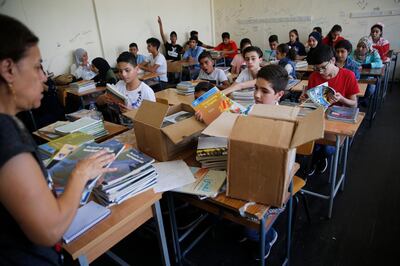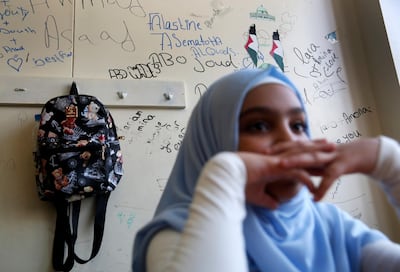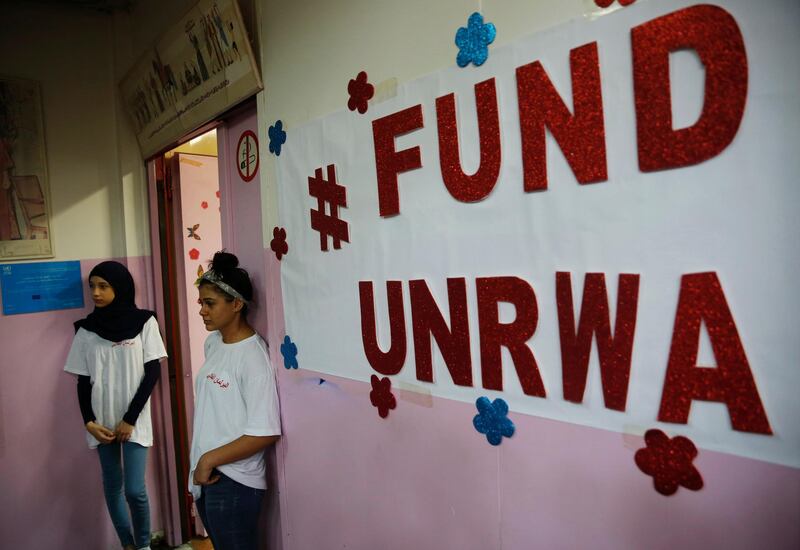When Najwa heard the US was cutting funding for the United Nations relief agency for Palestinian refugees, she feared for the future of her two young daughters.
Raised in a poverty-stricken settlement in Syria and living today in the sprawling Shatila camp in the suburbs of Beirut, they had nonetheless received a good education at UN schools — the eldest of the two, Bayan, speaks three languages.
But despite that, even before Donald Trump’s administration took aim at the agency, she said it was struggling to cope.
“Of course we worry about the schools closing, but at the same time there is such a lack of trust now between Palestinians and UNRWA that we have stopped relying on them in many ways,” said Najwa, who works in humanitarian assistance.
"The lack of services is so bad that some people wish it would be cut off completely so we can go to Europe like other refugees”, she added, giving only her first name.
______________
Read more:
Opinion: There was a darker agenda afoot when the US cut UNRWA funds
Why Trump team’s Jordan-Palestine confederation idea is a poisoned chalice
Opinion: Confederacy is the latest hammer blow to Palestinians
______________
Najwa’s comments, echoed by others in Shatila camp, reflect a growing frustration among Palestinians in Lebanon over deteriorating living conditions. Decades after being forced from their homeland, the community is beset by discrimination, a lack of legal rights and donor fatigue.
As the organisation that delivers that support, UNRWA often finds itself a target of ire. Palestinians in Lebanon have held protests against cuts in the past, and plan to do so again on Thursday.
“Life is harder than hard for us,” said Najwa. “There is no employment, not even basic health services. All the money that UNRWA has got over the last 70 years, where have they left their mark?”

UNRWA blames a series of funding crises over the past few years that have forced it to cut back on services, and said it now faces an “existential crisis.”
There are some 464,000 Palestinians registered with the agency in Lebanon, although a census last year found only 174,000 are living in the country and relying on UN services. Most are descendants of Palestinians who fled during the Arab-Israeli wars of 1948 and 1967.
The Trump administration’s decision to end its annual $350 million a year contribution sent shockwaves throughout the region, where UNRWA supports some 5 million people in Palestine, Jordan, Syria and Lebanon.
In a statement announcing the move, State Department spokeswoman Heather Nauert called UNRWA an "irredeemably flawed operation," one whose "endlessly and exponentially expanding community of entitled beneficiaries is simply unsustainable and has been in crisis mode for many years.”
The agency was already reeling from a major US reduction in funding announced in January this year, when it announced it would cut in half a $125 million aid package. That led to a flurry of fundraising from other sources, after which the agency’s annual budget shortfall still stood at $217 million. That number has now more than doubled.
The agency said these multiple funding crises, and others over the years, have limited its capacity.
"UNRWA has been unable to fully meet the needs of Palestine refugees in the past years because of growing needs and inability to cope with limited resources," Hoda Samra, a UNRWA spokeswoman told The National. "What we are facing now is an existential crisis."
Ms Samra said because of the US withdrawing its funding, some 66 schools providing education to 37,000 Palestinian children only have enough money to last the month of September. Medical services and poverty assistance for thousands are also at risk.
“In brief, UNRWA services are key to the stability of Lebanon and the whole region at a time when the Middle East faces multiple risks and threats, notably that of further radicalization,” she added.
But the funding crises creates an additional layer of complexity in Lebanon, beyond creating further hardship. The presence of Palestinians in the country has long been a controversial issue. The use of the country by militants as a base for guerrilla operations against Israel was one of the sparks of the 1975-1990 civil war.
The right of return has been supported by politicians from across the political spectrum and held tightly by Palestinians themselves for decades.
Many saw the funding cut as an attempt to remove that right by pressuring UNRWA to redefine the refugee status of millions of Palestinians. US officials have expressed a desire to reduce the number of officially registered refugees from 5 million — which includes the descendants of those who fled Palestine — to a few hundred thousand who were born there.
Despite numerous denials over the years, many Palestinians in Lebanon believe that UNRWA is drawing down services in a bid to end refugees right to return, long before Trump’s administration tried to do the same.
Such a move is not only opposed by Palestinians in Lebanon but also by most Lebanese politicians, who see the Palestinian presence as a burden and a risk to the country’s confessional balance.
Following the cut, Gebran Bassil, caretaker foreign minister, said Lebanon “will go all the way politically and diplomatically to ensure the right of return to Palestinians,” and called for other countries to meet the funding gap.

Noor, another resident of Shatila camp who also gave only her first name, saw the US move the same way.
“They want us to forget what Palestine is, what the right of return is,” she said. “Once we give it up, then they will bring the money back.”
That strategy appears to be having an effect on some, according to Najwa. Her husband is currently in Germany, having travelled by sea to make his way across Europe. She hopes to join him there soon and says others are considering the same.
“People have given up hope,” she said.





